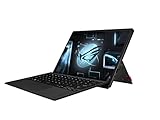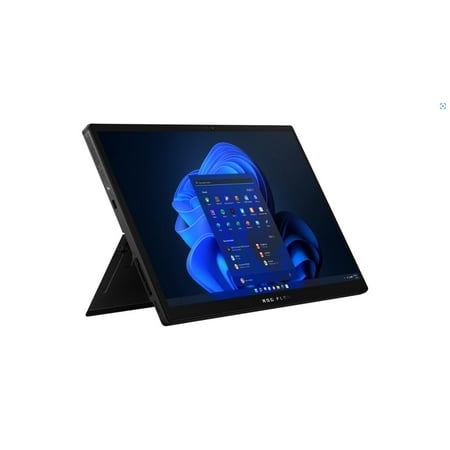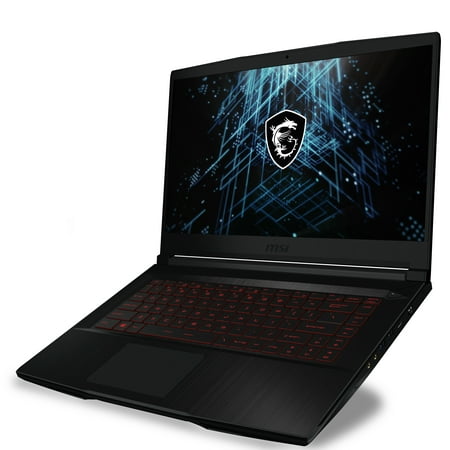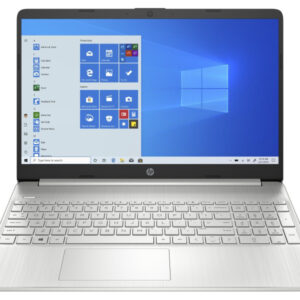– A magnetic keyboard, a kickstand and small bezels. It sounds like I’m describing a Microsoft Surface Pro but it’s actually a new gaming tablet from ASUS called the Flow Z13 and I’m pumped to tell you all about it. The key difference, aside from its bold design, is that it has considerably more power with the near top-of-the-line Intel Core i9 processor and NVIDIA’s RTX 3050 Ti graphics card. It’s built for gaming so I could start playing “Elden Ring” on it if I wanted to. I think I’ll do that right now. But because of it’s two-in-one design I can relax on the couch with a movie. I can also do some work on it if I want to. (laughs) Sure, those things can be done with any gaming laptop, but the Flow Z13 makes it easier and more comfortable to do than, say, a bigger laptop. It’s as cool as it sounds to be able to play my favorite games wherever I want to unencumbered by a hefty laptop. I can put it on a small table with some accessories attached or detach the keyboard and play on my lap. The Z13 weighs about two and a half pounds, so it’s easy to carry or slide into a bag. And it’s 100 watt USB-C power brick is no bigger or heavier than the one that comes with other small 13-inch laptops. The model that I’m testing costs $1899 for the tablet and keyboard together. A cheaper $1499 version that cuts the cost by ditching NVIDIA’s GPU will be available later this year. Here’s what’s inside of this 12 millimeter thick tablet. Intel’s Core i9 processor and an NVIDIA RTX 3050 Ti graphics chip. It has one terabyte of storage and 16 gigabytes of DDR5 memory, clocked at 5,200 megahertz. It’s just kind of mind-blowing that all of this is in here. And it has just enough ports to connect headphones and a couple of accessories with its USB-A port, Thunderbolt 4 port, USB-C port, and its Micro SD card slot. It’s 13.4 inch, 1080P touchscreen has a 16 by 10 aspect ratio. So in landscape mode, it’ll look taller than some laptops and tablets out there. That’s generally great for browsing the web as it gives you more vertical space for content but not every game supports this aspect ratio. At worst, a few of your games may run with little black bars at the top and bottom, which can be annoying. Plus, most TV shows and some movies were made to display on 16 by 9 aspect ratio screens. So get used to seeing those black bars on the Z13. It’s easy to be shocked by that $1899 price especially since those specs are what you get in a mid-range gaming laptop. But if you were stunned by that sticker, you should sit down because it can get a lot pricier than that. There’s also a $3,300 bundle that includes a Z13 with a 4k screen, along with a mobile version of NVIDIA’s RTX 3080 packed inside of this little external graphics card enclosure. It’s called the XG Mobile, and it connects with a cable that ASUS says delivers graphics via eight PCIE lanes for the fastest possible performance. And not only does it inject your games with better graphics it has multiple USB ports, an ethernet jack, video inputs and an SD card slot. If you want this eGPU al a carte, it will cost you $1,500. ASUS also has an AMD version with the Radeon 6850M XT for a hundred dollars less. And just to say it up front, I don’t think most people who are interested in the Flow Z13 should get the XG Mobile. It’s not because it doesn’t do its job, far from it. It’s simply because it balloons the cost well beyond what a comparably powerful gaming laptop should cost. Let’s focus first on what it’s like to use the Z13 on its own. It can’t perform gaming miracles by itself but it’s still a really impressive gadget. I’m usually reluctant to praise companies for cramming glitzy LEDs into products but come on, this looks awesome. ASUS should be showing off a little here. And most impressively, it feels like a laptop while I use it. What I mean by that is, well, a couple things. It comes with Windows 11. Plus the Z13’s keyboard is fantastic. These keys offer a surprising amount of travel, despite being fitted into a Surface Pro type cover lookalike. The layout retains almost all of the same keys you’d find on something like the Zephyrus G14, but with some small changes. And of course the keys are backlit. One major difference here compared to most modern laptops is that this track pad is teeny-tiny. But no self-respecting gamer should play without a mouse anyway. Okay, let’s talk about gaming. The discreet RTX 3050 Ti graphics chip inside of this tablet has four gigabytes of video memory and has 40 watts of total graphics power, which is simply how much power the GPU can draw. A higher number almost always indicates higher performance and most gaming laptops send 80 watts or more to their GPUs. So this is a relatively low-powered chip which is forgivable for a slim tablet. The Z13 is really good at running games that aren’t the most graphically demanding. In other words, it’s a great machine for playing a lot of indie games like “Death’s Door” and “Inscryption”. Those play perfectly, usually over 60 frames per second. There are countless games that should run really well on the Z13, but playing big AAA games with high end graphics like “Cyberpunk 2077” and “Elden Ring” is not the Z13’s specialty. But that doesn’t mean it’s not possible. “Cyberpunk” runs best at medium settings hovering between 25 and 30 frames per second while running off the battery, depending on the scene. While plugged in with its turbo performance mode enabled it got a more stable 35 to 40 frames per second, and bumping details up to high only slightly worsened the performance. That’s not bad, especially considering this tablet is running “Cyberpunk” which is not a sentence I thought I’d ever say. But the fidelity is a little lower and slower than I’d prefer to play this game on. Playing “Elden Ring” delivered similar results but I’m hopeful that performance will improve here when the developer releases some more patches. It’s currently not running great on most hardware, period. While running on battery, “Elden Ring” on the Z13 hung at around 25 frames per second in medium settings then jumped to a bumpy average of 40 or more frames per second while plugged in. Again, I wouldn’t want to put all of my precious Runes on the line with this choppy performance. As far as how long you can expect the battery to last during a gaming session, well, it depends on the game. Running through a half hour of testing with “Cyberpunk” and “Elden Ring” pushed the Z13 really hard and it had just about a third of its battery left afterward. But with less demanding games, you’ll get a little more longevity. We’ll have more complete battery testing in our full review up on the site. Depending on the games you like to play the Z13 may feel like a brilliant product designed just for you, or you’ll hit its performance ceiling immediately and curse its existence. But either way, one thing is for sure. And I’m gonna say this a lot. It’s a costly tablet that doesn’t deliver the same kind of performance you get from a similarly-priced gaming laptop. But what happens when you plug in that XG Mobile external GPU? Well, you get extremely good performance. In “Cyberpunk 2077” I was getting above 60 frames per second on ultra settings with the full suite of ray tracing settings and DLSS switched on. It was the same story for “Elden Ring” and everything else that I ran with the XG Mobile connected. Everything ran at or above 60 frames per second on the highest settings. The delta between what the internal RTX 3050 Ti and the RTX 3080M eGPU can deliver is evidently pretty enormous. But of course the XG Mobile dock is fast. You’d hope so, right? Though, performance will likely be less impressive if you pair the XG Mobile with the Z13 that has the 4k display, compared to the 1080P version that I’ve been testing. Buying the XG Mobile add-on is a tempting proposition for more reasons than just faster gaming performance. In the case of connectivity and power it helps the Z13 reach well beyond its means. But it also flies in the face of the Flow Z13’s core concept, to make your gaming more portable. Just because you can post up at the cafe with a tablet and the clunky eGPU, doesn’t mean you should. You’ll have its awkward cable management on full display. You’ll hog the table, and worse of all, you’ll be guilty of spending way more than you need to for a portable gaming machine. But, hey, at least the XG Mobile’s fans run quietly. Well, kinda. (fan whirring) It’s not too bad, but it’s definitely noticeable. The world isn’t facing a shortage of capable and portable game-ready devices. Outside the world of Windows, the iPads with the M1 processor give the Flow Z13 a run for its money in some ways. Like with their brilliant screens and peerless build quality. And for what it’s worth, the M1 is surprisingly capable at running games, just not the full suite of PC games you probably wanna play. And hey, what about the Steam Deck? That handheld starts at just $399 and for a fraction of the cost of the Flow Z13, the Deck is a compelling alternative that can play your Steam games and with a little tinkering it can even offer a full OS giving you flexibility to play games outside of Steam’s ecosystem. I’d like to recommend the Steam Deck. There’s one big problem, though. The Steam Deck is impossible to get if you haven’t already pre-ordered it. And this ASUS tablet doesn’t require workarounds to run laptop apps or other PC game platforms. So in terms of availability and ease of use, ASUS gets another win. But if you want to maximize performance per dollar I’d recommend a handful of gaming laptops instead. Assuming that all you want to do is play games, you can get way more for your money with something like ASUS’s Zephyrus G14 or the G15. Lenovo and Acer also make some cost-effective gaming laptops that could be good alternatives. It sounds like a failure on ASUS’s part that I can’t recommend the Flow Z13 to most people, but it’s far from a failure. It offers a glimpse of how awesome the future of portable gaming will be. And none of the laptops that I just recommended come close to being as thin or versatile as the Z13. With that in mind, this tablet is a reminder of how awesome the now of portable gaming is. And the Flow Z13 is a peak example of how ASUS leads the industry by actually bringing concepts like these to life, price be damned. It’s a good laptop. And with expectations in check, it’s a good gaming tablet, too. Now, if you’ll excuse me I have some important work to get back to. (smooth electronic music) (laughs) Hey everyone, thanks for watching this video. I have a question for you, though. Do you need the power of a gaming laptop? Or do you see yourself being able to live with a gaming tablet? Let us know in the comments below.
ASUS ROG Flow Z13 GZ301ZC-PS73
$1,797.99
ASUS ROG Flow Z13 (2022) Gaming Laptop Tablet, 13.4” 120Hz FHD+ Display, NVIDIA GeForce RTX 3050,...
$1,797.99
in stock
2 new from $1,699.99
7 used from $1,079.81
as of May 18, 2024 5:42 am
Amazon.com
| Part Number | GZ301ZC-PS73 |
|---|---|
| Model | GZ301ZC-PS73 |
| Warranty | 1YR International*/Eligible for 1YR free Domestic ADP upon registration with 1-way free shipping/2-way FREE shipping for standard hardware warranty repair |
| Color | Black |
| Release Date | 2022-02-28T00:00:01Z |








Reviews
There are no reviews yet.